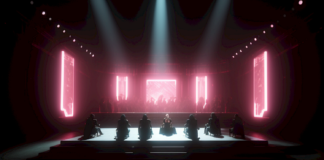A gifted class was undoubtedly that of Michael Jarrell at the University of Music in Vienna in the period 1995-2002, inspired by a composer particularly inclined toward interpretations, viewed as an autonomous, interactive model in the disciplines of the arts (not systematically music). In that class, then, Reinhard Fuchs is part of the eight composers who in ’97 founded the Gegenklang*, an entity aimed at the systematic creation of concerts channeled in different directions to support the interests of the listener (composition in favor of children, compositional and improvisational workshops, integration with writers and poets).
Kairos’s Fuchs monograph comes to terms with a defining style, the result of a metaphorical sense and movement: a series of sophistications applied at the different levels of timbre, the frequencies of the sounds and the rhythmic pulse of the composition: they undertake an emotional cognition that disrupts the conventions of musical language, with multi-layer textures in which you can capture ideas and feelings of an underlying literary imprint or visual images; although today Fuchs is more devoted to art direction, his idea of composition is remarkable: Mania features four compositions that highlight three from the arc of time ranging from 2001 to 2004, while the fourth (the one that gives its name to the collection) would be a more explicit statement of belonging to the contemporary composition assisting cinematic representation.
Fuchs’ style is characterized by the development of a dark and disturbing drama that finds support in all the elements of which it is composed: these are compositions in which the orchestra looks to dust off all the rough, possible orchestrations bringing to mind the instrumental orchestras of the modern cinema, which is a determining factor in a lot of new Austrian composition: Herrmann is a safe model, but there is also a strong desire to hear the authoritative voices of literature through music: Wo angst auf Umhulle prallt is a fervent example where the bombastic and frightening orchestral solutions (the ORF Radio-Symphonieorchester Wien) solidify the meaning of texts by Adolf Wölfli (Kurze Lebensbeschreibung), by Edgar Allan Poe (The pit and the pendulum) and Ungaretti (verses no. 26 of Il taccuino del vecchio): they are proposed respectively, in the original language and in a functional sequence, leaving the soprano Anna Maria Pammer the task of turning on unexpected links between them and highlighting the emotional content of the drama with a multiple engagements with the word (singing, reading, experimental vocal verses). The versatility expressed in this monodrama projects him into the territory of musical representation for films: Mania, leveraging the Klangforum Wien reinforced by electronics based on deaf or viscid sounds, is perfect to describe scabrous situations like those of Lynch’s post-modern films: in particular Fuchs chooses Blue Velvet and the constantly anxious climate of that experience: it is a refined work from the instrumental point of view, with many climaxes and feelings that lead his work into the territories of Neuwirth: Lynch would a magnificently enhanced if he were lucky enough to put this music in his films.
For Blue poles the reference is to the abstract painting by Pollock, musically an intricate structure, a network of twenty-three minutes that works on the concept of compositional layering, leaving full space to the imagination that can embark on spectacular events (I do not know why but I can think of at the same time Baron Munchausen riding on his ball and Hitchcock’s Psycho, duly processed with a greater complexity).
Dido is instead the subject of Descrittivi di stati d’animo di Didone, the mythological figure who commits suicide for love: Virgil in the Aeneid, Dante in the Inferno, as well as many important authors of literature have been concerned with her; Fuchs composes along the lines of the drama Wo angst auf Umhulle prallt, where he shuffles unhealthy sounds and unrecognizable verses of Ungaretti, obtaining again a remarkable achievement for timbre, texture and dramatic resolution.
With an excellent Klangforum conducted in turn by Cambreling, Furrer and Kalitzke, Mania will appeal in a special way to those who like a certain type of project, but there is not only the desire to model fear or similar sentiments, but also the attempt to show the strength and goodness of creativity that lurks in those art forms that border on those feelings; one cannot fail to mention that the drafts of Fuchs’s writing presented in the liner notes, which look a bit enigmatic with sketches arranged in ambiguous forms, give a hint of the darkness and depths of madness.
Note:
*The composers were: Reinhard Fuchs, Johannes Maria Staud, Gerald Resch, Robert M. Wildling (Austria), Marcel Reuter (Luxembourg), Miguel Gàlvez-Taroncher (Spain), Jorge Sànchez-Chiong (Venezuela), Aliser Sijaric (Bosnia-Herzegovina).
_________________________________________________________________________IT
Una classe dotata di pieni mezzi fu senza dubbio quella di Michael Jarrell all’Università della musica di Vienna nel periodo ’95-’02, ispirata da un compositore particolarmente sbilanciato sul versante delle interpretazioni rese come modello autonomo e interagente nei campi disciplinari delle arti non sistematicamente musicali. In quella classe, poi, Reinhard Fuchs fa parte di quegli otto compositori che nel ’97 fondarono il Gegenklang*, un’organismo teso alla creazione sistematica di concerti convogliati in varie direzioni a supporto dell’interesse dell’ascoltatore (composizione a favore dei fanciulli, workshop compositivi ed improvvisativi, integrazione con scrittori e poeti).
La monografia della Kairos dedicata a Fuchs fa i conti con uno stile ben definito, frutto del senso metaforico e del movimento: una serie di sofisticazioni applicate a livelli diversi sul timbro, sulle frequenze dei suoni e nella pulsazione ritmica della composizione impegnano una cognizione emotiva che disturba le convenzioni del linguaggio musicale, con tessiture multi-strato che captano idee e sentimenti di una sottostante impronta letteraria o delle immagini visive; nonostante oggi Fuchs sia più dedito alla direzione artistica, resta il fatto che è pregevole la sua idea di composizione: le quattro composizioni presenti in Mania evidenziano tre che si riferiscono all’arco di tempo che va dal 2001 al 2004, mentre la quarta (quella che dà origine alla raccolta) costituirebbe una più esplicita dichiarazione di appartenenza al versante della composizione contemporanea che assiste la rappresentazione cinematografica.
Fuchs si caratterizza per lo sviluppo di una drammaturgia oscura ed inquietante che trova appoggio in tutti gli elementi che la compongono: sono composizioni in cui l’orchestra va a spolverare tutte le impervie orchestrazioni possibili portando alla memoria le organizzazioni strumentali che furono del cinema moderno, un fattore seguito e determinante in molta nuova composizione austriaca: Herrmann è un modello sicuro, ma c’è anche molta voglia di far parlare attraverso la musica autorevoli voci della letteratura: Wo angst auf Umhulle prallt è un fervido esempio in cui le bombastiche e paurose soluzioni orchestrali (la ORF Radio-Symphonieorchester Wien) coagulano il senso dei testi di Adolf Wölfli (Kurze Lebensbeschreibung), di Edgar Allan Poe (Il pozzo e il pendolo) e di Ungaretti (versi del no. 26 del Il taccuino del Vecchio) proposti rispettivamente in lingua originale ed in successione funzionale, lasciando al soprano Anna Maria Pammer il compito di accendere legami inaspettati tra loro e spostare su un plurimo linguaggio subdolo della parola (canto, lettura, versi vocali sperimentali) il contenuto emotivo del dramma. La versatilità espressa in favore di questo monodramma lo proietta con bontà di mezzi verso la rappresentazione musicale cinematografica: Mania, facendo leva sul Klangforum Wien e su un rinforzamento dell’elettronica basata su suoni sordi o sguscianti, diviene un volano perfetto per descrivere situazioni scabrose come quelle dei films post-moderni di Lynch: in particolare Fuchs sceglie Blue Velvet e il clima costantemente ansioso delle sue vicende: è un lavoro raffinatissimo dal punto di vista strumentale, con numerosi climax e sensazioni che lo portano nei territori della Neuwirth: Lynch avrebbe avuto una magnifica valorizzazione se avesse avuto la fortuna di inserire nel suo film le sue musiche.
Per Blue poles il riferimento è alla pittura astratta di Pollock, musicalmente un territorio intricato di reti, ventitre minuti che lavorano sul concetto della stratificazione compositiva lasciando spazio vergine all’immaginazione che può imbarcare spettacolari eventi (non so perché ma mi vengono in mente contemporaneamente il Barone di Munchhausen a cavallo della sua palla e lo Psycho di Hitchcock, debitamente processati in una più ampia complessità).
Didone è invece il soggetto di Descrittivi di stati d’animo di Didone, la mitologica figura che si suicida per amore: di essa se ne occuparono Virgilio nell’Eneide, Dante nei canti infernali, nonché molti autori della letteratura che conta: Fuchs realizza un suono sulla falsariga del dramma di Wo angst auf Umhulle prallt, dove si incrociano suoni malsani e versi strascicati di Ungaretti, raggiungendo anche in questo caso un notevole risultato dal lato della timbrica, della texture e della risoluzione drammatica.
Con il Klangforum sugli scudi diretto a turno da Cambreling, Furrer e Kalitzke, Mania piacerà in maniera particolare a coloro che amano un certo tipo di progetti: ma non c’è soltanto la voglia di stilizzare la paura o sentimenti analoghi, poiché il tentativo è anche quello di mostrare la forza e la bontà della creatività che si nasconde in quelle forme di arte che rasentano quei sentimenti; non si può sottacere che le bozze della scrittura di Fuchs, presentate nelle note interne, dall’aspetto un pò enigmatico e con schizzi disposti in forme ambigue, diano una chance alle oscurità e agli abissi della follia.
Nota:
*I compositori erano: Reinhard Fuchs, Johannes Maria Staud, Gerald Resch, Robert M. Wildling (Austria), Marcel Reuter (Lussemburgo), Miguel Gàlvez-Taroncher (Spagna), Jorge Sànchez-Chiong (Venezuela), Aliser Sijaric (Bosnia-Herzegovina).







